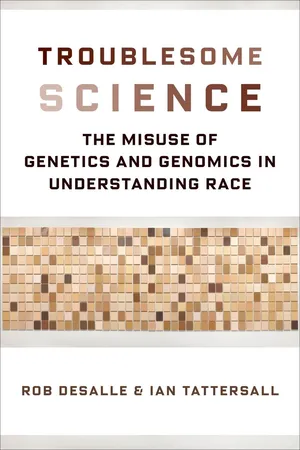
Troublesome Science
The Misuse of Genetics and Genomics in Understanding Race
- English
- ePUB (mobile friendly)
- Available on iOS & Android
Troublesome Science
The Misuse of Genetics and Genomics in Understanding Race
About This Book
It is well established that all humans today, wherever they live, belong to one single species. Yet even many people who claim to abhor racism take for granted that human "races" have a biological reality. In Troublesome Science, Rob DeSalle and Ian Tattersall provide a lucid and forceful critique of how scientific tools have been misused to uphold misguided racial categorizations.
DeSalle and Tattersall argue that taxonomy, the scientific classification of organisms, provides an antidote to the myth of race's biological basis. They explain how taxonomists do their science—how to identify a species and to understand the relationships among different species and the variants within them. DeSalle and Tattersall also detail the use of genetic data to trace human origins and look at how scientists have attempted to recognize discrete populations within Homo sapiens. Troublesome Science demonstrates conclusively that modern genetic tools, when applied correctly to the study of human variety, fail to find genuine differences. While the diversity that exists within our species is a real phenomenon, it nevertheless defeats any systematic attempt to recognize discrete units within it. The stark lines that humans insist on drawing between their own groups and others are nothing but a mixture of imagination and ideology. Troublesome Science is an important call for researchers, journalists, and citizens to cast aside the belief that race has a biological meaning, for the sake of social justice and sound science alike.
Frequently asked questions
Information
Table of contents
- Cover
- Series Page
- Title Page
- Copyright
- Dedication
- Contents
- Preface
- Acknowledgments
- 1. Evolutionary Lessons
- 2. Species and How to Recognize Them
- 3. Phylogenetic Trees
- 4. The Name Game: Modern Zoological Nomenclature and the Rules of Naming Things
- 5. DNA Fingerprinting and Barcoding
- 6. Early Biological Notions of Human Divergence
- 7. Mitochondrial Eve and Y-Chromosome Adam
- 8. The Other 99 Percent of the Genome
- 9. ABBA/BABA and the Genomes of Our Ancient Relatives
- 10. Human Migration and Neolithic Genomes
- 11. Gene Genealogies and Species Trees
- 12. Clustering Humans?
- 13. STRUCTUREing Humans?
- 14. Mr. Murray Loses His Bet
- Epilogue: Race and Society
- Notes and Bibliography
- Index
- Color Illustrations